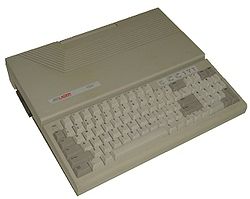
Laser 128
Encyclopedia

VTech
VTech is the common name of Video Technology Ltd. , a Hong Kong-based manufacturer of consumer electronics...
in 1984. Unlike the Apple II
Apple II
The Apple II is an 8-bit home computer, one of the first highly successful mass-produced microcomputer products, designed primarily by Steve Wozniak, manufactured by Apple Computer and introduced in 1977...
clones from Franklin
Franklin Electronic Publishers
Franklin Electronic Publishers, Incorporated is an American consumer electronics manufacturer based in Burlington, New Jersey, founded in 1981. Since the mid-1980s it has primarily created and sold hand-held electronic references, such as spelling correctors, dictionaries, translation devices,...
, VTech reverse-engineered
Reverse engineering
Reverse engineering is the process of discovering the technological principles of a device, object, or system through analysis of its structure, function, and operation...
the Apple ROMs
Read-only memory
Read-only memory is a class of storage medium used in computers and other electronic devices. Data stored in ROM cannot be modified, or can be modified only slowly or with difficulty, so it is mainly used to distribute firmware .In its strictest sense, ROM refers only...
using a clean room design
Clean room design
Clean room design is the method of copying a design by reverse engineering and then recreating it without infringing any of the copyrights and trade secrets associated with the original design. Clean room design is useful as a defense against copyright and trade secret infringement because it...
rather than copying them. Apple Computer
Apple Computer
Apple Inc. is an American multinational corporation that designs and markets consumer electronics, computer software, and personal computers. The company's best-known hardware products include the Macintosh line of computers, the iPod, the iPhone and the iPad...
challenged VTech in court, but unlike its efforts directed at Franklin, Apple was unable to force the Laser 128 off the market.
As its name suggests, the Laser 128 had 128 KB
Kibibyte
The kibibyte is a multiple of the unit byte for quantities of digital information. The binary prefix kibi means 1024; therefore, 1 kibibyte is . The unit symbol for the kibibyte is KiB. The unit was established by the International Electrotechnical Commission in 1999 and has been accepted for use...
of RAM. Like the Apple IIc
Apple IIc
The Apple IIc, the fourth model in the Apple II series of personal computers, was Apple Computer’s first endeavor to produce a portable computer. The end result was a notebook-sized version of the Apple II that could be transported from place to place...
, it was a one-piece semi-portable design with a carrying handle and a single built-in 5¼-inch floppy disk
Floppy disk
A floppy disk is a disk storage medium composed of a disk of thin and flexible magnetic storage medium, sealed in a rectangular plastic carrier lined with fabric that removes dust particles...
drive. Unlike the Apple IIc, it had a numeric keypad and a single Apple IIe-compatible expansion slot, which gave it better expansion capabilities than a IIc. VTech offered a metal 2-slot card cage that sat alongside the Laser 128 and attached to the computer's single slot, allowing for even greater expansion flexibility. The Laser 128 retailed for about $700, substantially less than the price of an Apple IIc.
Apple countered the Laser 128 with its upgraded Apple IIc Plus
Apple IIc Plus
The Apple IIc Plus is the sixth and final model in the Apple II line of personal computers, produced by Apple Computer. The "Plus" in the name was a reference to the additional features it offered over the original portable Apple IIc, such as greater storage capacity , increased processing speed,...
. VTech responded with the Laser 128EX and the Laser EX2.
The Laser 128 was aggressively marketed, both by mail order firms and in retail and catalog stores such as Sears
Sears, Roebuck and Company
Sears, officially named Sears, Roebuck and Co., is an American chain of department stores which was founded by Richard Warren Sears and Alvah Curtis Roebuck in the late 19th century...
. Even though its ROM was not derived from Apple's ROM, the Laser 128 series had a high degree of compatibility with its competition from Apple.
VTech owed much of this compatibility to the fact that they were able to license Applesoft BASIC
Applesoft BASIC
Applesoft BASIC was a dialect of Microsoft BASIC supplied with the Apple II series of computers. It superseded Integer BASIC and was the BASIC in ROM in all Apple II series computers after the original Apple II model. It was also referred to as FP because of the command used to invoke it instead...
(which constitutes the largest and most complex part of an Apple II's ROM contents) from Microsoft
Microsoft
Microsoft Corporation is an American public multinational corporation headquartered in Redmond, Washington, USA that develops, manufactures, licenses, and supports a wide range of products and services predominantly related to computing through its various product divisions...
just as Apple did, heavily reducing the amount of code that had to be reimplemented. Microsoft had made most of its money by keeping the rights to the software that it sold to others. Likewise, Apple had failed to secure an exclusive distribution license for the Applesoft dialect of BASIC, and VTech was free to buy it. Much Apple software depended on various assembly routines that are a part of BASIC in ROM, and it's quite likely that the Laser would not have been as successful had it not had compatible ROM entry points.

